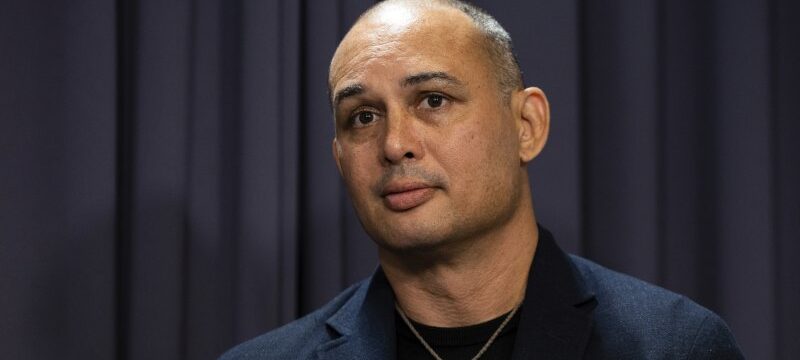Save articles for later
Add articles to your saved list and come back to them any time.
Yes campaigner Thomas Mayo has spoken of the “emptiness in my chest” after the crushing defeat of the Voice to parliament, but vowed to keep fighting for recognition which is “unfinished business” for Australia.
Indigenous leaders took a week of silence following the defeat of the Voice to parliament referendum, but that silence ended on Sunday when a joint, unsigned statement was sent out by the Uluru Dialogue – a leading Yes campaign group – that said Australians who voted No committed a shameful act.
Prominent Yes campaigner Thomas Mayo says there must be consequences for the No campaign after the unsuccessful Voice referendum.Credit: Dominic Lorrimer
A draft version of the statement praised Prime Minister Anthony Albanese’s “gallantry in the campaign” but was critical of his “attempted exculpation of those who voted No”.
But the final version of the letter, released on Sunday night, removed those comments in a move that highlights the debate among Indigenous leaders about the prime minister’s role in the campaign.
The draft letter also criticised Queensland Labor Premier Annastacia Palaszczuk and No campaigners Warren Nyunggai Mundine and senators Jacinta Nampijinpa Price and Kerrynne Liddle. All personal references to this quartet were cut from the final version of the open letter.
A second, private letter to Albanese has been sent by some of the country’s most senior Indigenous leaders and Yes campaigners.
That second letter strikes a different tone to the public letter and thanks Albanese for following through on his commitment to hold the referendum. Indigenous leaders including Tom Calma, Marcia Langton, Tony McAvoy and Rachel Perkins were involved in its drafting. All four either declined to comment or did not respond to a request for comment.
The first, public letter also states Voice supporters will come back together in future to map a path forward to establish “independent of the Constitution or legislation – an Aboriginal and Torres Strait Islander Voice to take up the cause of justice for our people”.
Several sources with knowledge of the drafting of the letter, who asked not to be named so that they could speak freely, said Uluru Dialogue leader Megan Davis and Yes23 campaigner Noel Pearson were involved in the drafting of the letter. Neither Pearson nor Davis responded to requests for comment.
Mayo, a union official who has worked towards recognition for years, is one of the first Yes campaigners to speak publicly after the week of silence ended.
He said he supported what other leaders said in the public letter but added that he was not a signatory to it.
“I’m conscious that it is strongly worded, I don’t want to blame the Australian people [for the referendum result],” he said.
“What I ask for people to think about is that people who aspire to lead this nation in the Coalition, and their behaviour, misinforming people about what the referendum was about and what it could and couldn’t do, I think that is the true shame. That is a wasted opportunity,” he said.
“I am deeply appreciative of the five and a half million people who voted Yes, of those who did consider their answer, whatever it was, with the information presented to them and didn’t vote with any darkness in their heart. And especially to the 70,000 volunteers who worked on the referendum.
“I personally still have hope that as a nation in the future we will address this still unfinished business of recognition.”
The Central Land Council also released a statement on the Voice referendum result on Monday that questioned the future of reconciliation in Australia, noting that about 75 per cent of voters in remote areas of the Northern Territory voted for change, compared to an NT vote of about 40 per cent.
The council said a “deliberate strategy of deception and misinformation adopted by prominent ‘No’ campaigners turned many previously good-willed people against us. In doing so, they gave permission for racism to run wild”.
“Given the result of the referendum and the conduct of the ‘No’ campaign, there are now serious questions about whether reconciliation is still a viable strategy in Australia. Nevertheless, one thing remains certain: sooner or later the nation state must deal with the enduring fact of Aboriginal sovereignty.”
Mayo, who was one of the faces of the Yes campaign, said he would return to working for the Maritime Union of Australia in his position of assistant national secretary.
But he said the wounds of the referendum defeat would linger for some time to come.
“I still feel an emptiness in my chest that hurts. I’m gutted, especially about the attacks on people who are already marginalised, with the worst [socioeconomic] outcomes in the country.“
Cut through the noise of federal politics with news, views and expert analysis from Jacqueline Maley. Subscribers can sign up to our weekly Inside Politics newsletter here.
Most Viewed in Politics
From our partners
Source: Read Full Article

